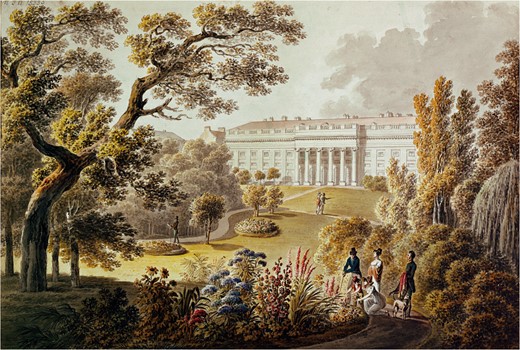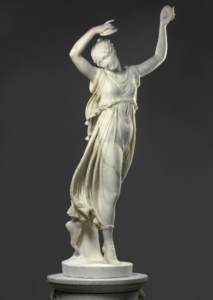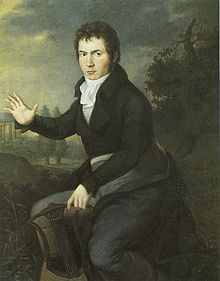
Palace and Garden of Prince Razumovsky in the Viennese Suburb of Landstrasse (c. 1825). Watercolour by Eduard Gurk (1801–41). Wien Museum. Photo: Imagno / Getty Images
Ludwig van Beethoven (1770 – 1827), so fond of walks in woods and in the countryside, must have been in his element in the extensive gardens of his patron Count Andrey Razumovsky (1752 – 1836), the Russian ambassador in Vienna. Extensive is an understatement. The Count’s residence and gardens were conceived on a grand scale to impress. The mannered, ‘artificial’ style of French gardens that had been popular was given short shrift. English garden design was chosen instead, showcasing nature through irregular, secluded paths and viewpoints onto magnificent natural vistas. One can easily imagine Beethoven’s 6th (‘Pastoral’) symphony – dedicated to Count Razumovsky – as the soundtrack to a tour around the gardens.
Razumovsky was an art collector and played the violin. He also played the torban, a Ukrainian traditional instrument – with good reason; he was born into Ukrainian aristocracy and clearly valued his Ukrainian heritage.
Without doubt, his artistic interests were bound up with his diplomatic role. Conveying an impression of an acute awareness of pan-European culture was part of his diplomatic mission.
His enthusiasm for music extended to employing an excellent string quartet led by Ignaz Shuppanzigh – a good friend of Beethoven – as part of his numerous employees. Razumovsky even provided them with pensions on their retirement.
The Schuppanzigh Quartet holds an important place in the history of chamber music. These were the first musicians in Europe whose careers existed around chamber music rather than orchestral or solo playing. They also premiered many important new works, including the three Op 59 quartets that Razumovsky commissioned Beethoven to write.
All of Beethoven’s ‘Razumovsky’ quartets include Russian themes, although it is unclear whether this was a request by the Count to include them or whether Beethoven included them out of respect and gratitude. The slow movement of Op 59 No 3, which we are playing in our current programme, contains the most Russian sounding music in this quartet – possibly suggesting the vast expanses of the steppes rather than the luxury of sumptuous palaces.
Part of Razumovsky’s palace burnt down in the early hours of New Year’s Day 1815, the evening after a ball at which the guest of honour had been Tsar Alexander 1. A large amount of Razumovsky’s art collection went up in flames. Distraught, he became a shadow of his former self, living in seclusion in Vienna until his death in 1836.
Wealth and influence might fade away but Beethoven’s music speaks to each new generation with startling urgency.



Recent Comments